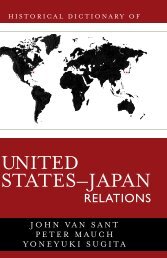Private Academies of Chinese Learning in Meiji Japan: The Decline ...
Private Academies of Chinese Learning in Meiji Japan: The Decline ...
Private Academies of Chinese Learning in Meiji Japan: The Decline ...
Create successful ePaper yourself
Turn your PDF publications into a flip-book with our unique Google optimized e-Paper software.
178 PRIVATE ACADEMIES OF CHINESE LEARNING IN MEIJI JAPAN<strong>The</strong>y were to venerate what is higher, love what is small andchildlike and never to neglect good forms <strong>in</strong> their actions. (4)Read<strong>in</strong>g lessons (sodoku) were to take place <strong>in</strong> the morn<strong>in</strong>gs fromdawn; the afternoon was devoted to the explication <strong>of</strong> texts(gikai). (5) Students were to attend on all the days when lessonstook place. 15<strong>The</strong> application was turned down. It is not clear whathappened to Shijodō subsequently, but later newspaper reports(see below) suggest that it operated for a short while beforeclos<strong>in</strong>g <strong>in</strong> 1874. Nish<strong>in</strong>omiya returned to a post <strong>in</strong> the prefecturalgovernment, responsible for education (shōmuka gakumu kakari). 16Akita’s policy <strong>of</strong> suppress<strong>in</strong>g private schools was notcont<strong>in</strong>ued with equal force. In 1878 the M<strong>in</strong>istry <strong>of</strong> Educationloosened its control over private schools, and Akita too adopted aless radical approach, approv<strong>in</strong>g some juku <strong>of</strong> teachers without alicence. 17 Not everyone was happy with this change; one KatanoShigeo, a student described as a ryūgakusei (from outside theregion?) at the Akita teacher tra<strong>in</strong><strong>in</strong>g college, expressed the fearthat allow<strong>in</strong>g juku aga<strong>in</strong> would mean the end <strong>of</strong> the new schools,s<strong>in</strong>ce the unenlightened preferred the old-style terakoya andjuku. 18 Others, however, welcomed the new freedom and thechoice it gave people; Ishii Kōkyō condemned Katano’s argumentand claimed that people abandoned the public schools <strong>in</strong> favour<strong>of</strong> juku because the juku were more appropriate for them. 19Apparently more than one public school found itself withoutpupils, because these preferred the newly permitted juku. InKakunodate even the assistant teachers from the public schoolleft when two scholars were permitted to open juku. A newteacher had to be called <strong>in</strong> from a neighbour<strong>in</strong>g district and hecalled <strong>in</strong> the children’s families to lecture them on the importance<strong>of</strong> public school education. But people cont<strong>in</strong>ued to prefer juku,so the district governor himself expla<strong>in</strong>ed the <strong>of</strong>ficial view to thepeople. 20<strong>The</strong> Education Ord<strong>in</strong>ance (kyōikurei) <strong>of</strong> September 1879 madethe establishment <strong>of</strong> private schools easier and even made itpossible for them to receive public support. <strong>The</strong> change <strong>of</strong> policyencouraged Nish<strong>in</strong>omiya Tōchō to apply for permission toreopen Shijodō. He resigned from his post with the prefecture on5 December. An acqua<strong>in</strong>tance, styl<strong>in</strong>g himself Kizendō Shuj<strong>in</strong>(probably a pseudonym), prepared a publicity text for thenewspapers. 21 He described how Nish<strong>in</strong>omiya had been forced toclose Shijōdō to his own deep regret and that <strong>of</strong> his predecessor,













